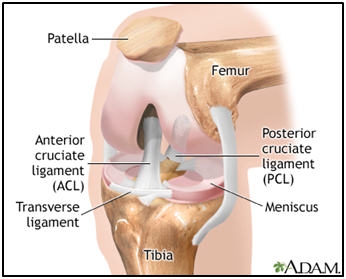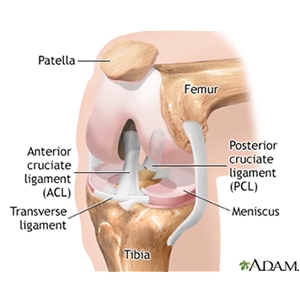
The ACL, or anterior cruciate ligament, is a ligament within the knee joint. It is an important stabilizer of the knee. Injuries to the ACL occur mostly in 15-45 year olds experienced by approximately 1 in 1750 people per year. Women are at a 2-4 times increased risk of ACL injuries. And roughly 100,000 ACL reconstructions are performed each year in the United States.
Most ACL injuries happen as non-contact injuries, involving pivoting, decelerating, or planting of the foot. Shoe wear can also contribute to injuries. For example, cleats have an increased resistance for twisting the knee versus regular tennis shoes. Playing surfaces are also important. Dry surfaces have higher friction between the shoe and the surface, leading to increased stress on the knee. If an ACL injury occurs, most patients will feel a “pop” in the knee.
There are several symptoms commonly associated with ACL injuries including:
- Swollen knee.
- Difficulty bending and straightening the knee.
- Difficulty when putting your full weight on the injured leg.
- Feeling of instability when trying to walk.
Diagnosis
When diagnosing ACL injuries, we begin with an x-ray of the injured knee. This is to rule out a possible broken bone as a cause of your knee pain. If the x-ray is negative and ACL injury is suspected, an MRI of the knee will be ordered. Learn more about Magnetic Resonance Imaging (MRI).
Usually an MRI of the knee is done on a separate day from your initial appointment because it can take up to 45 minutes. The MRI will be sensitive enough to show an ACL injury as well as other associated injuries including meniscus tears, collateral ligament injuries, and articular cartilage damage.
Once we have all your results in hand, we then discuss treatment options with you.
If you feel that you may have a torn ACL or you have other concerns about your knee, please contact our office to set an appointment. Look for our second part of the ACL Injury Blog Series coming soon. Subscribe to our Facebook page to be sure you know when it’s been posted.






